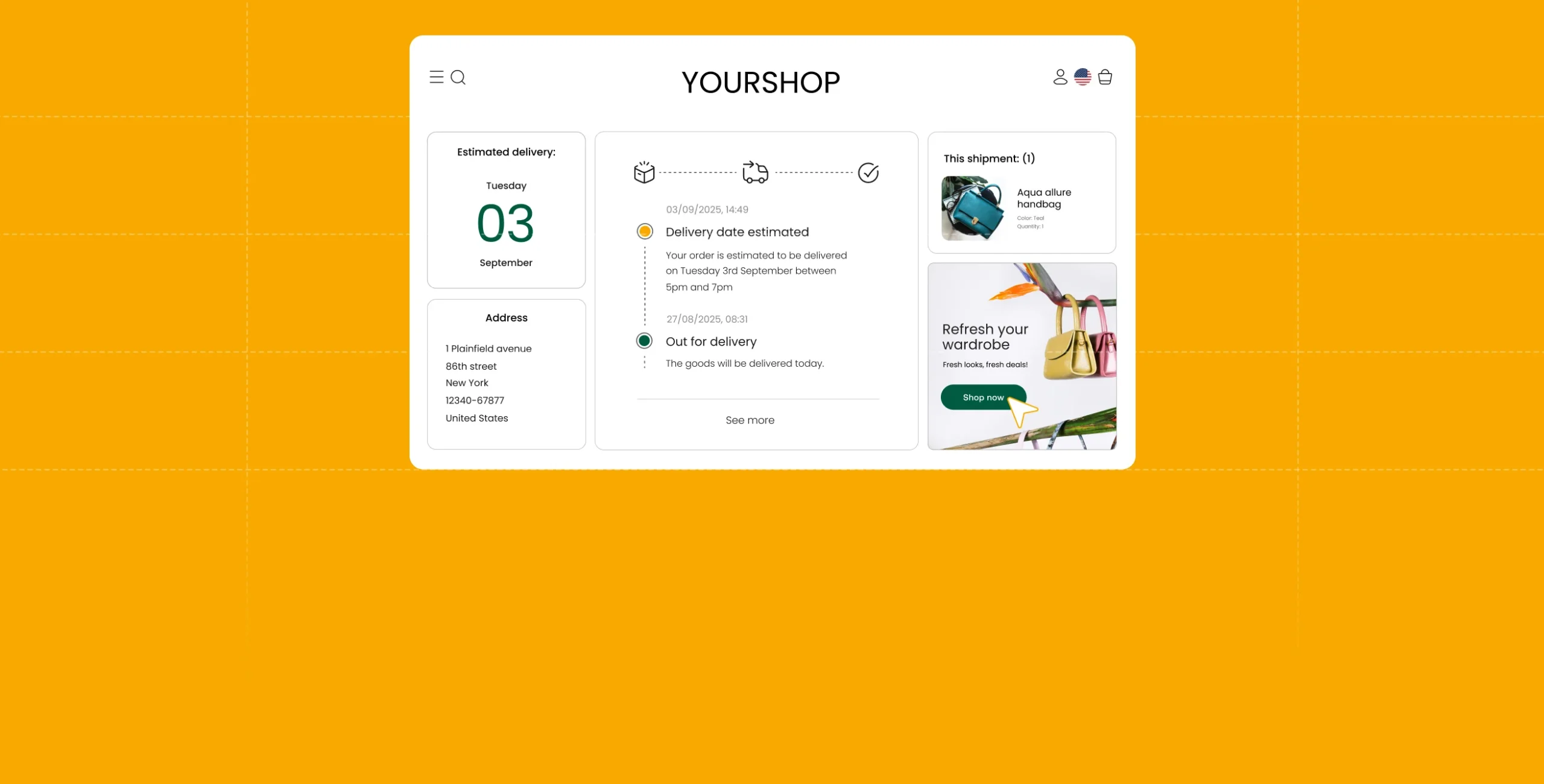Why parcelLab?
Discover why parcelLab is the go-to post-purchase partner for top retailers across the globe

Why parcelLab?
Discover why parcelLab is the go-to post-purchase partner for top retailers across the globe
Why parcelLab
Why top retailers choose parcelLab over the rest
AI and innovation
Transforming post-purchase with AI
PPX maturity curve
Discover where you stand on the curve
PPX Institute
Turn transactional relationships into customers for life
Post-purchase audit
Experience your brand the way your customers do
Platform
Platform support
PLATFORM
Meet the platform
The industry’s first and only PPX platform tailor-made for retailers
WHAT'S NEW
Benchmarking
Benchmark against the industry in real-time
Copilot
Turn delivery anxiety into customer satisfaction with AI
AI Email Editor
Streamline operations and reduce complexity with AI-powered automation
Campaign Manager 2.0
Run campaigns that drive revenue
Smart Survey
Collect feedback and drive improvements


OVERVIEW
Enhance delivery experience
Seize control of your delivery experience
CAPABILITIES
Track & communicate
Keep your customers engaged
Set up a branded tracking portal
Keep customers in your ecosystem
Create personalized journeys
Deliver the right message, at the right time
Run targeted campaigns
Create campaigns that convert
Predict delivery delays
See delivery issues before they happen and take proactive action
Streamline claims management
Reclaim time, revenue, and customer trust
Resolve customer inquiries
Empower your customer service teams

OVERVIEW
Make returns seamless
Transform customer dissatisfaction into revenue retention by digitizing returns and exchanges.
CAPABILITIES
Track and inform returns status
Create a seamless returns experience that retains customers
Self-service returns portal
Let customers register returns with ease
Personalize returns journey
Encourage exchanges over refunds
Forecast returns volume
Anticipate return patterns before they happen
Offer flexible returns
Give your customers versatile return options that cater to their preferences


OVERVIEW
AI-powered post-purchase
Optimize every post-purchase interaction with parcelLab's AI agents
CAPABILITIES
Execute with AI
Harness the power of AI agents
Predict with AI
Stay ahead with real-time insights & forecasts
Simplify with AI
Cut complexity & streamline operations
Personalize with AI
Deliver tailored experiences

Solutions
Reduce WISMO & WISMR calls
Keep customers in the loop & support smarter
Turn returns into revenue
Make returns seamless, maximize revenue
Manage complex post-purchase scenarios
Handle exceptions, claims & logistics
Optimize post-purchase campaigns
Boost engagement & drive conversions
Enhance personalization and engagement
Create 1:1 tailored experiences

Customer success stories
Join the leading brands worldwide. You're in good company.
Resources
Company

Why parcelLab?
Discover why parcelLab is the go-to post-purchase partner for top retailers across the globe
Why parcelLab
Why top retailers choose parcelLab over the rest
AI and innovation
Transforming post-purchase with AI
PPX maturity curve
Discover where you stand on the curve
PPX Institute
Turn transactional relationships into customers for life
Post-purchase audit
Experience your brand the way your customers do
PLATFORM
Meet the platform
The industry’s first and only PPX platform tailor-made for retailers
WHAT'S NEW
Benchmarking
Benchmark against the industry in real-time
Copilot
Turn delivery anxiety into customer satisfaction with AI
AI Email Editor
Streamline operations and reduce complexity with AI-powered automation
Campaign Manager 2.0
Run campaigns that drive revenue
Smart Survey
Collect feedback and drive improvements

OVERVIEW
Enhance delivery experience
Seize control of your delivery experience
CAPABILITIES
Track & communicate
Keep your customers engaged
Set up a branded tracking portal
Keep customers in your ecosystem
Create personalized journeys
Deliver the right message, at the right time
Run targeted campaigns
Create campaigns that convert
Predict delivery delays
See delivery issues before they happen and take proactive action
Streamline claims management
Reclaim time, revenue, and customer trust
Resolve customer inquiries
Empower your customer service teams

OVERVIEW
Make returns seamless
Transform customer dissatisfaction into revenue retention by digitizing returns and exchanges.
CAPABILITIES
Track and inform returns status
Create a seamless returns experience that retains customers
Self-service returns portal
Let customers register returns with ease
Personalize returns journey
Encourage exchanges over refunds
Forecast returns volume
Anticipate return patterns before they happen
Offer flexible returns
Give your customers versatile return options that cater to their preferences

OVERVIEW
AI-powered post-purchase
Optimize every post-purchase interaction with parcelLab's AI agents
CAPABILITIES
Execute with AI
Harness the power of AI agents
Predict with AI
Stay ahead with real-time insights & forecasts
Simplify with AI
Cut complexity & streamline operations
Personalize with AI
Deliver tailored experiences

Reduce WISMO & WISMR calls
Keep customers in the loop & support smarter
Turn returns into revenue
Make returns seamless, maximize revenue
Manage complex post-purchase scenarios
Handle exceptions, claims & logistics
Optimize post-purchase campaigns
Boost engagement & drive conversions
Enhance personalization and engagement
Create 1:1 tailored experiences

Customer success stories
Join the leading brands worldwide. You're in good company.
Resources
Company

Our parcelLab E-Commerce Shipping Study 2021 analyzes the top 100 German online stores in the areas of checkout, shipping and returns. How exactly does that work? We conducted test orders at the most successful German online retailers at the end of last year for this purpose. Which companies are the best in terms of operations experience?
Most major online retailers have significantly improved the customer experience in recent years. However, there is still room for improvement when it comes to shipping and returns services. Some online retailers are already setting the bar pretty high when it comes to checkout, shipping, delivery and returns. Almost every store operator can learn something from these best practice cases.
s.Oliver came out on top as the best in checkout in the 2021 e-commerce shipping study. Reasons for this: At s.Oliver, customers can choose their preferred logistics provider themselves. Furthermore, the store can score points with alternative delivery offers and express deliveries. Another big plus point for the store is the fact that all information is summarized again in the checkout as an overview.
In the shipping process IKEA can convince, because here customer loyalty is capitalized. By integrating an item list into the shipping notification, the company can offer its customers an outstanding shopping experience. The appreciation for the customer is also expressed through personalized communication that is adapted to the customer’s needs. The track & trace page is also very clear and designed in the branding of the store.
flaconi can secure the title of winner in delivery. The packaging in the branding of the online store is particularly convincing and thus improves the brand image of the company. However, flaconi also keeps the aspect of sustainability in mind and does not use any filling material made of plastic. The company thus focuses on a positive unpacking experience. This is rounded off by the inclusion of discount codes and coupons.
H&M makes the running when it comes to returns. Here, for example, a collection of the return is possible. Furthermore, the return of items at H&M is always free and easy, because the return label is already sent directly in the package. The customer is also informed at any time about the status of the return. The refund is also fast and hassle-free.
MediaMarktSaturn emerges from the study as the overall winner. The company offers its customers an outstanding shopping experience and has its operations experience under control. All important information is made available to the customer at all times – both by e-mail and in the customer account. MediaMarktSaturn is also optimizing its mobile ordering processes in the retailer app: all processes, from checkout to shipping and returns, have been adapted for mobile use and offer customers a positive user experience.
Not only customer satisfaction, but also efficient processes on the retailer side stand or fall with operational order processing, the Operations Experience (OX). This starts with service and winds its way through warehouse processing to shipping and returns. Yet companies still have little visibility and little to no control over the OX, as the E-Commerce Shipping Study 2020 shows. Many retailers still leave important contact points to the logistics service provider. A big mistake that results in not only insightful consumer data but also upselling opportunities being lost. Customers, in turn, receive only cryptic messages that keep them groping in the dark about their order status.
It is therefore elementary that retailers control all relevant process steps in fullfilment themselves. Only in this way can problems be identified and circumvented at an early stage and the customer proactively informed at all times. This is ultimately reflected in renewed store visits and an increase in sales. We offer workflow control at all relevant points in the process as well as individual, personalized customer communication. If a delivery is delayed, customers are automatically informed. At the same time, additional relevant content can be used to guide shoppers back into the store and encourage them to make a new purchase.
This benefits all sides: companies ensure a consistent brand experience and maximize cross-selling potential – not least because of the outstanding customer experience.
Sounds interesting, but you need help implementing your Operations Experience? No problem! We’re happy to help. Contact us!
An error has occurred, please try again later.An error has occurred, please try again later.
By submitting the form, you agree to receive marketing information according to our Privacy Policy. You can unsubscribe at any time.